Culture
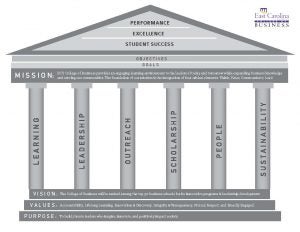 The College of Business (COB) culture at ECU is evolving and maturing into a culture of quality characterized by innovation, improvement, impact and engagement. Innovation has been a defining characteristic of our college over the years and is at the heart of what we do. We are on the forefront of online delivery systems, new programs, and innovative instructional delivery as the landscape of higher education changes. Our strategic plan places substantial emphasis of the sustainability of business education into the future as markets and technologies change. This requires a culture of innovation.
The College of Business (COB) culture at ECU is evolving and maturing into a culture of quality characterized by innovation, improvement, impact and engagement. Innovation has been a defining characteristic of our college over the years and is at the heart of what we do. We are on the forefront of online delivery systems, new programs, and innovative instructional delivery as the landscape of higher education changes. Our strategic plan places substantial emphasis of the sustainability of business education into the future as markets and technologies change. This requires a culture of innovation.
 The ECU COB was one of the first universities in the state of North Carolina to embark on the use of the world-wide web to deliver courses and, eventually, entire programs. The COB approaches to delivery and assurance of academic integrity in the online teaching process were adopted by ECU and then served as the online delivery model for the entire UNC system.
The ECU COB was one of the first universities in the state of North Carolina to embark on the use of the world-wide web to deliver courses and, eventually, entire programs. The COB approaches to delivery and assurance of academic integrity in the online teaching process were adopted by ECU and then served as the online delivery model for the entire UNC system.

Our supply chain management programs at the undergraduate and graduate levels were among the first in the country. We continue to add new programs at a swift pace. Examples include an undergraduate concentration in risk management insurance and certificates in entrepreneurship and in professional selling. At the graduate level, recent additions include certificates in project management, business analytics, leadership of organizations, and tourism and hospitality. We recently added the Miller School of Entrepreneurship, which serves the entire university out of the COB. The undergraduate degree in Entrepreneurship is its first four-year program. This new school and its programs help to position ECU as a hub for innovation in the region.
Over the years we have been adding problem-based learning classrooms that facilitate the use of the flipped classroom. This type of teaching model is gaining increased popularity among faculty and students in the COB as our campus-based customers seek a differentiated face-to-face experience.
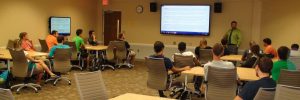 While new platforms and programs continue to feed the vitality of our college, an emphasis on continuous improvement assures our processes and programs are the best they can be. To this end, we have embraced the Baldrige Performance Excellence model with the goal of being the business school of choice for potential students. We began our Baldrige journey in late 2014, with the aim of receiving the North Carolina Performance Excellence Award for education in the near term. Most of our staff and a critical mass of faculty have been trained in the Lean Six Sigma methodology, with a significant number earning the green belt.
While new platforms and programs continue to feed the vitality of our college, an emphasis on continuous improvement assures our processes and programs are the best they can be. To this end, we have embraced the Baldrige Performance Excellence model with the goal of being the business school of choice for potential students. We began our Baldrige journey in late 2014, with the aim of receiving the North Carolina Performance Excellence Award for education in the near term. Most of our staff and a critical mass of faculty have been trained in the Lean Six Sigma methodology, with a significant number earning the green belt.
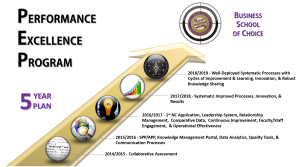
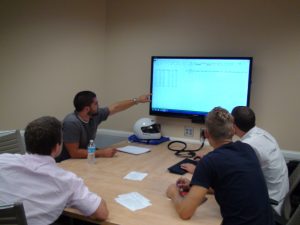 The COB Performance Excellence Program places emphasis on improving not only our support processes, but also on improving the quality of both teaching and student learning. We have developed a systematic process for assessing and improving all our educational programs. This includes not only degree programs, but also minors and certificates. Faculty are engaged in this process through actual assessment of programs and courses and through a variety of committees that focus specifically on assuring that students acquire the knowledge and competencies outlined in the COB mission. In addition to the business knowledge needed for students to excel in their careers, we also shape our students into values-based leaders with excellent communication and critical-thinking skills.
The COB Performance Excellence Program places emphasis on improving not only our support processes, but also on improving the quality of both teaching and student learning. We have developed a systematic process for assessing and improving all our educational programs. This includes not only degree programs, but also minors and certificates. Faculty are engaged in this process through actual assessment of programs and courses and through a variety of committees that focus specifically on assuring that students acquire the knowledge and competencies outlined in the COB mission. In addition to the business knowledge needed for students to excel in their careers, we also shape our students into values-based leaders with excellent communication and critical-thinking skills.
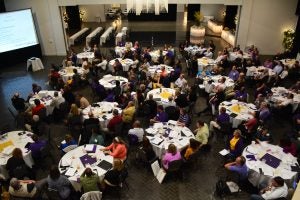 Since 2014, we have held a gathering of the faculty and staff early in the Fall semester to reflect on improvement activities from the prior year and to make plans for the current year. This has traditionally been accomplished through a one-day COB annual retreat focused on both strategic planning and assurance of student learning. Recently, we have sharpened our focus on learning improvement by replacing the one-day retreat with a one-week long series of faculty meetings. Each meeting targets a specific program or set of programs that faculty review for quality and potential areas for improvement. One of our main goals for this series of meetings is to complete process improvements or “close the loop” from the prior year. Closing the loop involves identifying critical to quality learning objectives and, through data collection and analysis at the close of each academic year, implementing guided improvements to program curriculum and pedagogy. Following implementation of the improvements, the learning objectives are assessed again for effectiveness of the improvements. The cycle or “loop” is ongoing.
Since 2014, we have held a gathering of the faculty and staff early in the Fall semester to reflect on improvement activities from the prior year and to make plans for the current year. This has traditionally been accomplished through a one-day COB annual retreat focused on both strategic planning and assurance of student learning. Recently, we have sharpened our focus on learning improvement by replacing the one-day retreat with a one-week long series of faculty meetings. Each meeting targets a specific program or set of programs that faculty review for quality and potential areas for improvement. One of our main goals for this series of meetings is to complete process improvements or “close the loop” from the prior year. Closing the loop involves identifying critical to quality learning objectives and, through data collection and analysis at the close of each academic year, implementing guided improvements to program curriculum and pedagogy. Following implementation of the improvements, the learning objectives are assessed again for effectiveness of the improvements. The cycle or “loop” is ongoing.
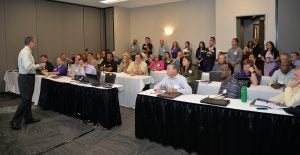 To support our culture of learning improvement and process effectiveness, faculty are provided with training on our learning improvement philosophy and methodology through both in-house seminars and external consultant workshops. During the past several years we have engaged the services of an AACSB accreditation consultant to meet with our faculty on our campus and to provide ongoing training workshops for assurance of learning (AOL). Nearly all our faculty have been engaged in one or more of these consultant training workshops. These have included training on the AOL process, structuring an AOL system, creating an AOL culture, course versus program assessment, developing learning goals and objectives, and developing rubrics. The consultant also meets, as needed, with specific AOL committees to address issues or concerns. Internal training, typically delivered by the Associate Dean for Academic Quality, includes details on closing the loop, standard operating procedures, and division responsibilities for assessment in the COB.
To support our culture of learning improvement and process effectiveness, faculty are provided with training on our learning improvement philosophy and methodology through both in-house seminars and external consultant workshops. During the past several years we have engaged the services of an AACSB accreditation consultant to meet with our faculty on our campus and to provide ongoing training workshops for assurance of learning (AOL). Nearly all our faculty have been engaged in one or more of these consultant training workshops. These have included training on the AOL process, structuring an AOL system, creating an AOL culture, course versus program assessment, developing learning goals and objectives, and developing rubrics. The consultant also meets, as needed, with specific AOL committees to address issues or concerns. Internal training, typically delivered by the Associate Dean for Academic Quality, includes details on closing the loop, standard operating procedures, and division responsibilities for assessment in the COB.
Every fall semester a team of faculty from our Assurance of Learning Committee performs an internal audit of all assessment activities from the prior year to assure proper execution and loop closure of all applicable learning objectives. This also gives us an occasion to evaluate the effectiveness and efficiency of the COB learning improvement system and take appropriate actions to adjust the improvement system.